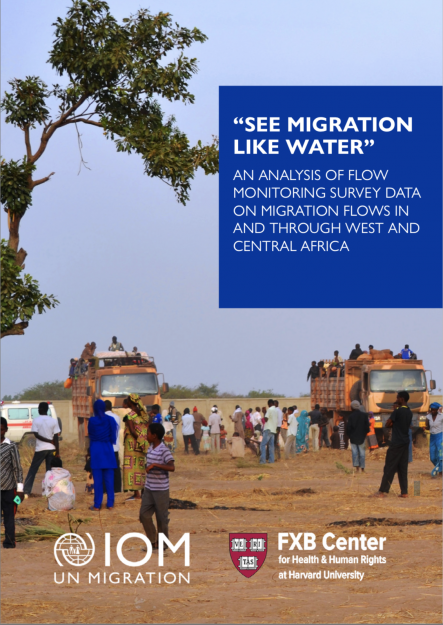BOSTON, MA – The François-Xavier Bagnoud Center for Health and Human Rights at Harvard University (FXB Center) and the International Organization for Migration (IOM) today released “See Migration Like Water: An Analysis of IOM Flow Monitoring Survey Data on Migration Flows in West and Central Africa,” a detailed analysis of migration flows and migrant vulnerability on routes within and from West and Central Africa.
The West and Central Africa region provides evidence of dynamic migratory patterns, including long histories of diverse intraregional and interregional migration flows. The complexity and rapidly evolving characteristics of mobility in the region, combined with the emergence of new threats, such as the COVID-19 pandemic, aggravate risks en route and leave many migrants unprotected.
The study is based on IOM’s Displacement Tracking Matrix (DTM) flow monitoring survey data gathered from over 110,000 migrants, collected across 38 transit points in seven countries in West and Central Africa. In addition, qualitative data from expert interviews conducted in 2020 illuminate the impact of the COVID-19 pandemic on migrants’ journeys and their well-being.
The report analyzes intersecting aspects of migrant vulnerability across the most popular West and Central African migration routes – examining risk and protective factors at the individual, household, community, and structural level – and provides recommendations to protect migrants. They include:
- Exploring the expansion of safe, legal and regular migration options
- Enhancing access to support services along migratory routes
- Enhancing the capacity of agencies and governmental actors
- Creating livelihood opportunities in origin and neighboring countries
- Improving efforts to prevent, combat and eradicate human trafficking in the region
The findings of this report emphasize the immediate and pressing need for a sustainable, multilayered, harm prevention-based strategy to protect migrants at a time when regular migration pathways are limited and the need for mobility is high. As the world grapples with the ongoing COVID-19 pandemic and the highest levels of global inequality in human history, migration will continue to be a life-saving strategy for people.
To listen to the FXB Center’s Professor Jacqueline Bhabha and Dr. Vasileia Digidiki discuss the report’s findings with IOM researchers, click here. To read the report in full, click here.
About the FXB Center for Health and Human Rights at Harvard University
The François-Xavier Bagnoud Center for Health and Human Rights (FXB Center) was founded and endowed by Albina du Boisrouvray in 1993. Her goal was to provide protection to children by furthering the vision for health and human rights of founding director Jonathan Mann, and it received the enthusiastic collaboration of then Dean Harvey Fineberg. We use interdisciplinary approaches to promote equity and dignity for those oppressed by racism, poverty and stigma, nationally and around the world. We are proud to partner with a diverse group of scholars, educators, elected officials, government agencies, nonprofit organizations and members of the international policy community to advance health and human rights, and to show the harmful effects of violations on children. To learn more, please visit fxb.harvard.edu.
About the International Organization for Migration
The International Organization for Migration (IOM) works to help ensure the orderly and humane management of migration, to promote international cooperation on migration issues, to assist in the search for practical solutions to migration problems and to provide humanitarian assistance to migrants in need, including refugees and internally displaced people.
###
MEDIA CONTACTS:
Veronica Lewin
FXB Center for Health and Human Rights at Harvard University
Megan Daly
FXB Center for Health and Human Rights at Harvard University

